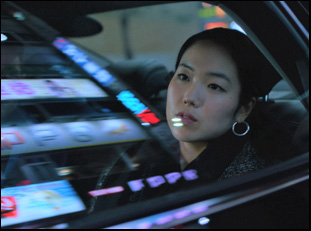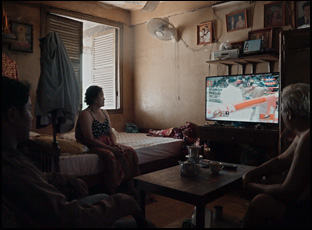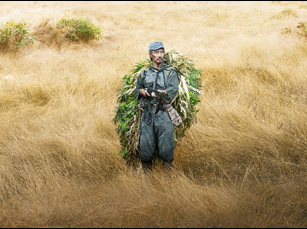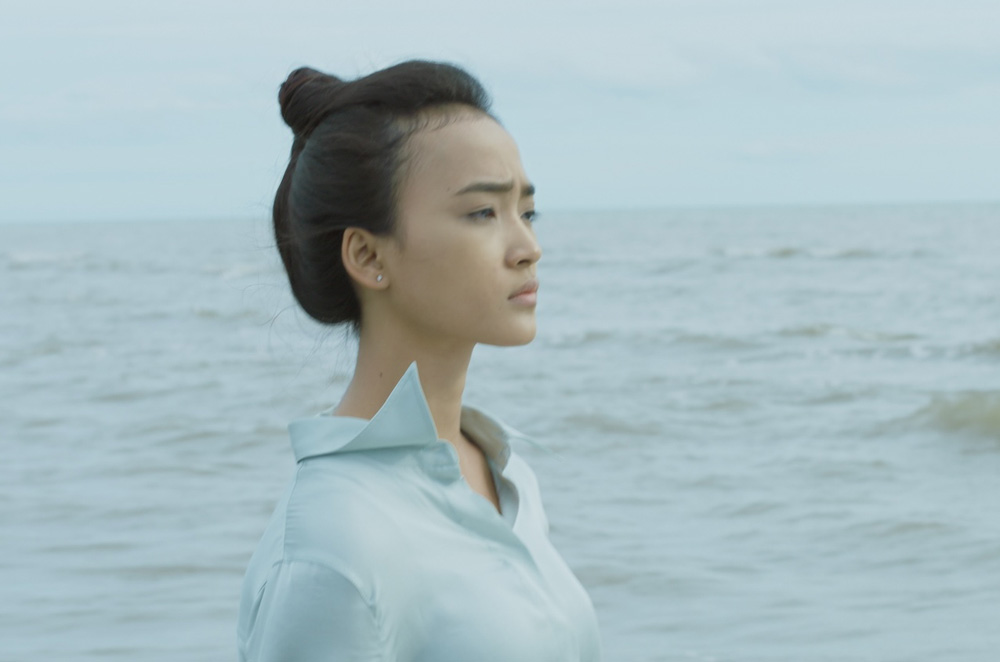It wasn’t only that Davy Chou was deprived of having any memories of his own of Cambodia, the country of his parents’ descent after they fled the region shortly before the Khmer Rouge took over in the 1970s and gave birth to him in France. But the filmmaker realized for even those that grew up there but might be too young to have a grasp on the politics or the generation that followed, there was simply no way to look back at what happened or the beautiful culture that had been established before it when the Khmer Rouge had systematically wiped out an entire era of filmmaking, with many filmmakers dying in the genocide or scattering to the wind and the negatives for their work were destroyed or lost.
Chou returned to Cambodia in 2009 when he was 25, an experience he sublimated to some degree in his 2022 drama “Return to Seoul” when rediscovering his roots in Cambodia overlapped with a friend going through all the same emotions after seeking out her birth parents in Korea, and while the director made a name for himself when the film became an international sensation, he saw it as a tide that would lift all boats when he spent the previous decade planting the seeds for a resurgence in Cambodian filmmaking, inspiring a generation that sought answers for where they had come from to begin to create their own cultural record.
Fittingly, “Return to Seoul” will open the series “From Director to Producer: Davy Chou Selects” on Friday at the Metrograph Theater in New York with the director in person, but the weekend-long event will screen other gems that have been a product of Chou’s efforts over the years to establish a community of filmmakers and production base in Cambodia. In 2009, he founded the collective Kon Khmer Koun Khmer, which initially set about reviving the history of the local 1960s and ‘70s films that had gone missing before coming to make a few short films of their own, and with Kavich Neang and Steve Chen, he would start the more formal production company Anti-Archive in 2014 that allowed for many younger Cambodians to pick up cameras to express themselves alongside his own effort to capture the post-genocide landscape in his debut feature “Diamond Island.”
Even without shedding a rare light on the post-war Cambodian experience, the shorts collection screening June 23rd is a showcase of fresh perspectives on cinema itself with Polen Ly’s “Further and Further Away,” Sreylin Meas’ “California Dreaming,” Kavich Neang’s “New Land Broken Road” and Danech San’s “A Million Years” all full of unforgettable imagery, ruminating on the notion of being held back by a past its characters can only understand so much about, and Neang’s 2019 documentary “Last Night I Saw You Smiling,” screening earlier on the 23rd, approaches history more directly with a view of an apartment complex known as “White Building,” a haven for artists in Phnom Penh in its final days as the filmmaker seeks out recollections from present-day residents before it is condemned. Arthur Harari’s 2021 eras-spanning biography “Onoda: 10,000 Nights in the Jungle,” may appear as the odd man out in a number of ways in the Metrograph series, telling the story of Japanese soldier Hiroo Onoda who refused to give up the fight long after World War II had ended, but it will cap things off in epic fashion when the film is not only a personal favorite of Chou’s, but a reflection of what can be accomplished in Cambodia when part of the large-scale production was filmed there with a regional crew.
In advance of the Metrograph festivities, but in the midst of a months-long U.S. tour for the filmmaker where he has visited college campuses and set up a month-long Cinesalon at New York’s L’Alliance New York’s Florence Gould Hall, Chou graciously took the time to talk about cultivating new cinematic voices in Cambodia and building an infrastructure for them to thrive as well as how they’ve inspired him.

We’ve been in touch with Metrograph already a bit before. They reached out last year because they were doing a special program on Jean Gremillion’s films, and they must’ve read I like Gremillion on some list for Sight and Sound or Criterion, so they reached out to say, “Do you want to say a few words?” Then I was in New York three months ago, doing this tour of East Coast universities with “Return to Seoul” and I was catching up with Adeline Monzier from Unifrance, who programs the Metrograph as well, and she was just done doing that a program focus on Alain Gomis, the French director who I know, and we were talking about the fact that I will be around in Chicago in June, so she came up with the idea. And I was actually contacted at the same time by The L’Alliance New York in New York, who wanted to do some kind of program, so we all sat around a table online and came up with a program that would allow me to show some of the films I directed and produced.
I’ve been a producer in Cambodia since 2015 when I was producing the first fictional short of Cambodian director Kavich Neang, who later on I accompanied to produce three of his short films and one feature-length documentary, which we will show at the Metrograph, which is an amazing Chantal Akerman-esque documentary called “Last Night I Saw You Smiling” and then later on his first [narrative] feature that I’m showing at Alliance Francaise, “White Building.” That was my start as a producer and really something that’s part of my journey of my life today, which is being surrounded by Cambodian directors born after the genocide who want to tell stories and express themselves about the situation and their daily reality. It’s something that really excites me and gives meaning to my life as well.
It’s been nearly 10 years, so there are a bunch of short films from these new voices from Cambodia. I never thought of curating them together, but it came as a suggestion to make this program and I did one at the Taipei Film festival and I did one in France recently, so to make it happen in New York at the Metrograph, which is such an amazing theater with a history of presenting artistic movies and independent movies, it’s really cool for me to bring these young voices and for many, people haven’t heard about them yet, but to bring them together and to present them in that program is super exciting.
Your debut feature “Diamond Island” actually dealt with this question of how the post-genocide generation saw themselves moving forward in Cambodia, but what’s it been like to actually see it through their eyes when directing their own films?
The truth is I wasn’t born in Cambodia. My first experience there was when I was 25, which when you think of it was exactly the same for the main character of my film “Return to Seoul.” She’s going back to Korea where she knows nothing and a lot of my own feeling going to Cambodia for the first time is actually translated into the story. All that is to say that [these films I’ve produced] are very different that what I express because it’s really the perspective of someone who was born in the country in the late ’80s and grew up in the aftermath of one of the most tragic moments of history, so their perspective on their country and the evolution on what they have been surrounded with is totally different, which is not to say not opposite.
It was a fascinating experience to be with them, and I’m grateful that I could receive these realities portrayed in the visions of talented directors and to be part of that. It’s also very diverse. You have two female directors sharing something that is linked with their experience growing up as women in Cambodia in a country that is developing itself, and also [they] tackle ecological and development issues that are very present. Meanwhile, you have another director named Polen Ly, who made an amazing short film named “Further and Further Away” that deals with the much more impoverished population, [and while “California Dreaming” and “A Million Years”] have main characters who grew up in the city, Penom Penh, “Further and Further Away” is about two ethnic minorities that have to leave the place where they grew up because it’s been flooded by the water because of the creation of a dam. So these give you glimpses of different kinds of realities that the country is struggling with and what the youth is struggling with at the moment.

It’s totally right to put it like that, and a lot of things in my life have been like that, which is you never make the big plan. If you try to have a big vision, you might feel intimidated, so we just go step by step. At the beginning, the creation of Anti-Archive was an opportunistic way of having a structure to be able to co-finance my film Diamond Island, but with no real vision of producing [work of other] people. But then we had this [company] and I associated myself with Kavich [Neang] and another Taiwanese director Steve Chen and Kavich expressed the desire that he wanted to use this box [we created] for us to produce short films. I was working with other people who were not making films yet, but they were two women who looked so talented in what they were doing and so sensitive in their understanding of film that I asked, “Would you be interested in directing?” And they just seized the opportunity and in 2018, we produced three short films made by these three women and they were great and then they started touring festivals. Suddenly, it’s as if the empty box found its meaning naturally and then it was clear that we will continue that journey and accompany these filmmakers into making other shorts or feature films and open the house to other directors.
It was very organic and very natural with this collective spirit, and [Cambodia] is a country that has a lot of energy and desire, but not a lot of financial infrastructure to help sustain [production]. It’s still a very small market and making short films has never made anyone rich, so it’s a very long journey and we need this spirit of being helpful to each other. But that’s what filmmaking is about, so to learn together to make these films with that spirit helps to shape what we bring to bigger projects. Now we’re working on Kavich Neang’s new feature and a feature from Danech San, the director of “A Million Years” and “Sunrise in My Mind,” which she’s [working on] in the Cannes Cinefoundation residency in Paris, so it’s about how to really grow together and keep the spirit.

Yes, we do. It’s both a practical thing of learning together, but on a short film, people will work for free to get to know what we’re doing, and then on a feature film people can be more comfortable. And it’s not always like that, but to learn a different position in a country that doesn’t have a strong industry yet, it’s helpful as well to have an understanding and to develop skills [on different facets of the filmmaking process].
For example, San Danech started as a casting assistant for me on “Diamond Island,” and she was a secretary of production on the shooting, and then later on when we were doing that big epic project “Onoda: 10,000 Nights in the Jungle” by Arthur Harari, the co-writer of “Anatomy of a Fall,” I found myself a bit intimidated taking the line production, which is basically taking care of everything in Cambodia on my shoulder because that’s not something I’m used to and Harari has been one of the most talented directors in France since I made my first short film. He’s always been someone I look up to and when he came to Cambodia to make “Onoda,” I brought with me Danech San and Sreylin Meas, who had a big responsibility in the production. Then when we were doing “White Building” by Kavich [Neang], Danech became the assistant of the script supervisor, which is a much more artistic position of observing and understanding the mise-en-scene, so it’s really being multifaceted, so that we can help each other when we need to, but we can also grow as directors by seeing things in a more complete and complex way.
Has it been rewarding to see so far how these films have been received internationally?
It’s really cool because the images that we have from Cambodia that reach international audiences are still limited. There are some films of course, but people will sometimes limit that to the work of Rithy Panh, for example, which have amazingly dealt with the question of the history and the genocide and it’s so important. But because Rithy Panh did take that huge question on his shoulder in his career, that became also the [main] images we receive. There are a few others who have been doing as well that show another perspective, but these voices of people born at the end of the ’80s and early ’90s, give you a more fragmented representation of Cambodia, and I think this is a vision that people who haven’t been to Cambodia expect. So it’s very interesting to see that suddenly [these filmmakers] are also challenging themselves about the representation that they have and towards what they think this country or this region is. That’s particularly interesting for me because I think that’s what cinema can do, which is displace our perspectives and our prejudices, and in terms of representing Cambodia, this multiplicity of voices telling you how they see things and that there are many voices as directors is very exciting to see.
“From Director to Producer: Davy Chou Selects” will run at the Metrograph in New York from June 22nd with a screening of “Return to Seoul” at 6:30 pm, and June 23rd with “Last Night I Saw You Smiling” at 2:30 pm, the Cambodian Shorts Program at 4:15 pm and “Onoda: 10,000 Nights in the Jungle” at 6 pm.




